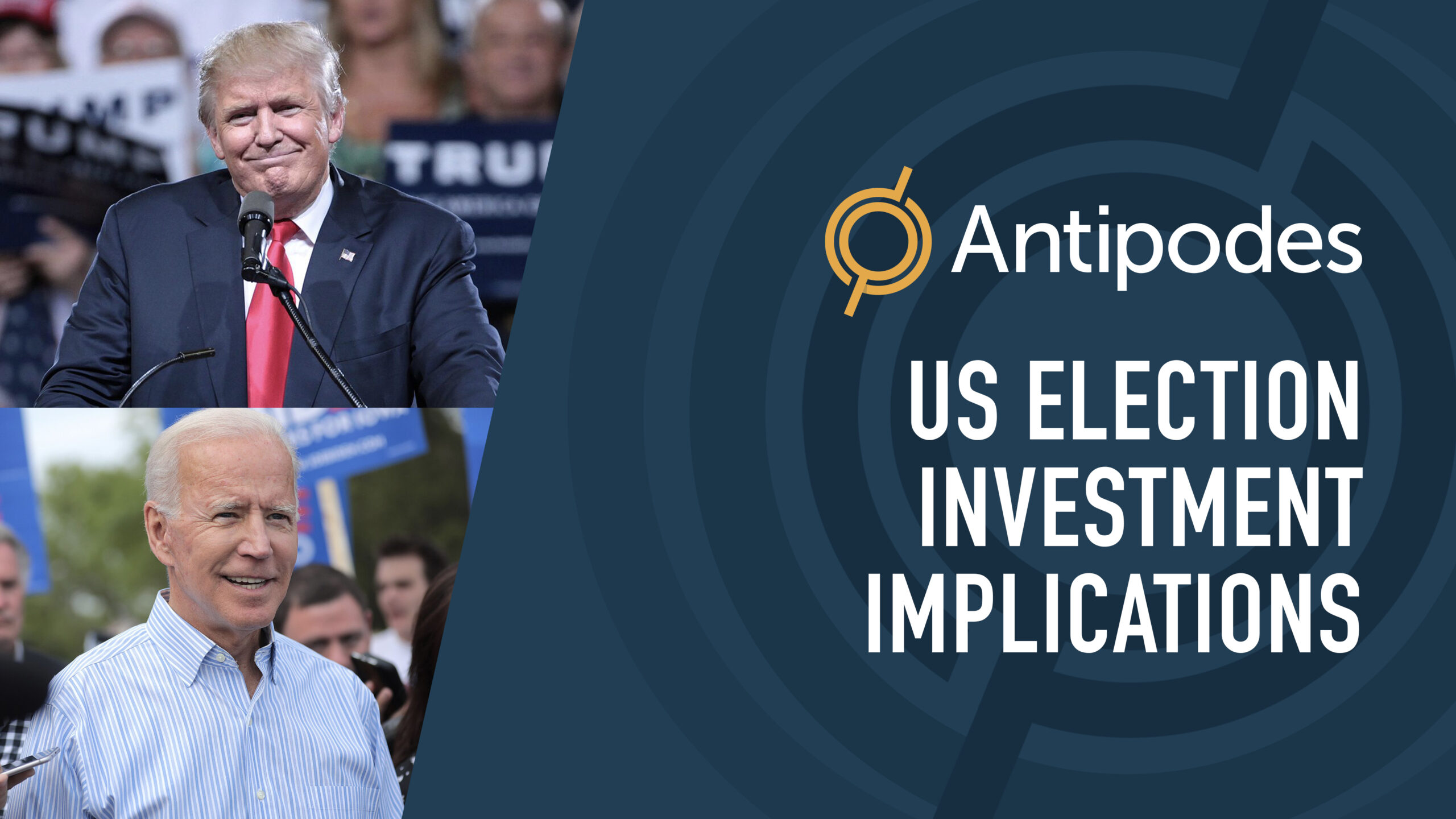Regardless of the US election result, Antipodes’ view is the longer-term direction of markets will be very similar.
In our latest podcast episode, US election: Two pathways, one destination for markets, Jacob Mitchell explains this in further detail, and also analyses some of the more immediate election investment implications.
Listen to the full episode or continue reading below.
Democrats or Republicans simply represent two slightly different pathways to a very similar destination.
There will be more fiscal stimulus whether the Democrats or the Republicans emerge victorious – it’s the nature of stimulus that will vary. The additional stimulus is likely to be further amplified by COVID-19 vaccine success – a factor ultimately far more important to the long-term direction of markets than the election.
The Democratic pathway
Biden has campaigned on a 7 trillion-dollar fiscal agenda with the big-ticket items comprising education, infrastructure/decarbonisation and healthcare spending.
Aggressive income and investment stimulus is positive for economic growth. In that backdrop real rates can rise from record low levels, particularly with the additional pressure of funding the enormous fiscal deficit in the US, and the dollar would potentially weaken over the longer-term.
In global portfolios this favours high-quality cyclicals that have been ignored by the market, particularly stocks that benefit from infrastructure spending like 5G and decarbonisation plays.
In decarbonisation this accelerates the emerging super cycle we’ve been discussing for some time – suddenly you have the three biggest regions – Europe, China and the US – embarking on long-term decarbonisation plans. This could lead to a switch from a ‘virtual’ to a real asset investment cycle. Volkswagen and EDF (Électricité de France) are examples of beneficiaries in Antipodes’ portfolio.
An environment of super-charged fiscal stimulus and higher rates is also likely to be beneficial to financials – which are valued at incredibly attractive multiples in both an absolute and relative sense – as higher rates take some of the pressure off net interest margins and stimulus likely buffers overall credit costs in the economy.
You have to consider how the Democrats’ aggressive spending plans will be funded. Biden is proposing lifting taxes to cover almost half of the spending, but there will still be a net 2 trillion addition to the fiscal deficit, from today’s 4 trillion dollars.
This will mean greater taxes on the corporates and the wealthy, a negative for domestic US businesses. And there’s the potential for a less friendly policy environment for big tech and pharmaceutical companies.
Much has been said about what might happen if the Democrats win enough Senate seats to remove the filibuster (essentially a tactic used in the Senate to obstruct and delay legislative change). This would open the door to reform and could further embolden the agenda.
Removing the filibuster rule is extreme. It’s not out of the question, but remember the Republicans and Democrats have previously controlled both the House and the Senate and haven’t removed the filibuster for legislation.
There is also the possibility of Biden winning and the Republicans maintaining control of the Senate. The Democrats would have a difficult time passing legislation and progressing their fiscal policy agenda.
There would still be fiscal stimulus, but it may be more muted as each stimulus package would have to be a negotiation between the Republicans in the Senate and Democrats in the House.
The Republican pathway
For Trump, it can’t get better. He already has the Senate and is unlikely to gain the House. There is the possibility of a weakened scenario where the Republicans lose the Senate, but this is generally the status quo scenario. Will it be status quo for markets?
In the more immediate term that is likely. The market reaction won’t be as friendly to cyclical stocks as a Democratic clean sweep, and secular growth stocks could extend their rally in the short-term, especially if vaccine news was to disappoint.
Naturally, Trump wants economic success, so there will still be more stimulus but it will be negotiated. That additional stimulus upside will flow through to cyclically-exposed businesses, but perhaps in a less accelerated fashion than what could happen under a Democratic clean sweep.
Positioning investment portfolios
Investors can enjoy both pathways.
Cheaper expressions of growth in Antipodes’ portfolio, such as Microsoft and Facebook in the US or Alibaba and Tencent in China, can emerge as winners on both paths. These companies have been lockdown beneficiaries, but will continue to benefit in a reopening scenario. They are pragmatic value, and provide some balance for continuation of the status quo from a US political perspective.
At the same time we think exposure to high quality, lower multiple, more cyclical stocks such as Siemens and CapitalOne will benefit as government sponsored investment programmes and the potential normalisation in consumer behaviour boosts economic activity.
Subscribe to receive the latest insights and updates from Antipodes

